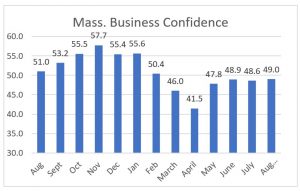Join 150+ Companies Shaping Massachusetts' Economy
The Business Confidence Index (BCI) gauges the economic vitality of Massachusetts. Scored on a 100-point scale, with 50 indicating neutrality, readings above 50 signify optimism, while those below indicate pessimism. The BCI is overseen by the AIM Board of Economic Advisors, comprised of distinguished economists and business leaders. It assesses employer readiness to expand, hire, and make capital investments.

Business Outlook Remains Stable, Pessimistic
in August
Business confidence remained stable during August – and just slightly pessimistic – as employer sentiment bounced between a steady economy and policy uncertainty.
The Associated Industries of Massachusetts Business Confidence Index (BCI) gained 0.4 points last month to 49.0, continuing to move in a narrow range just below the 50-reading separating optimism from pessimism.
The August BCI was 2.0 points less than the same month a year ago. It marked the sixth consecutive month that confidence remained in the pessimistic range.
The results came amid mixed economic signals in both Massachusetts and the nation.
MassBenchmarks reports that the state economy grew at a solid 2.6 percent annual rate during the second quarter, but the 4.8 percent unemployment rate in Massachusetts during July was significantly higher than the national mark of 4.2 percent. National inflation, measured by the consumer price index, remained steady at 2.7 percent year-on-year in July. Federal Reserve Chair Jerome Powell gave his clearest indication yet on August 22 that the policy interest rate might be reduced as soon as September.
“The overall economic picture is complex, featuring a resilient stock market driven by AI optimism that contrasts with weaker consumer sentiment and a cautious Federal Reserve, which may cut interest rates soon. That complexity continues to color business confidence in Massachusetts,” said Sara Johnson, Chair of the AIM Board of Economic Advisors (BEA), which oversees the BCI.
Participant comments underscored the murky nature of the economy.
“The word ‘uncertainty’ continues to dominate the business outlooks for our customers. Uncertainty over hiring. Uncertainty over imports. Uncertainty over pricing. And, if the business is to any degree dependent on government funded research especially at MIT or Harvard, there is absolutely no way to forecast. Having said that, everyone also knows that they cannot just ‘wait and see,’ so they are moving ahead, but in short bursts,” wrote one company.
Another company reported: “Uncertainty around tariffs, interest rates, regulatory changes, and other currently unpredictable policy decisions are causing our clients to hesitate on decisions and on executing existing plans.”
The AIM Index, based on a survey of more than 140 Massachusetts employers, has appeared monthly since July 1991. It is calculated on a 100-point scale, with 50 as neutral; a reading above 50 is positive, while below 50 is negative. The Index reached its historic high of 68.5 on two occasions, 1997-98, and its all-time low of 33.3 in February 2009.
Constituent Indicators
The constituent indicators that make up the Index were mixed in August.
The confidence employers maintain in their own operations was unchanged at 51.6. That figure was 1.1 points less than in August 2024.
The Massachusetts Index, assessing business conditions within the commonwealth, inched up 0.1 point to 45.6, leaving it 4.3 points lower than a year earlier. The US Index measuring conditions throughout the country gained 1.9 points to 44.6, down 2.4 points from a year ago.
The Current Index, which assesses overall business conditions at the time of the survey, increased 2.2 points to 49.9. The Future Index predicting conditions six months from now fell 1.5 points.
The Manufacturing Index, which had been a bright spot for much of 2025, lost ground in August, dropping 2.2 points to 46.1. The Employment Index rose 0.3 point to end the month at 49.5.
Small companies (49.7) were more confident than large companies (49.5) or medium-sized companies (47.4).
Participate in the Business Confidence Index
Explore our Business Confidence Index Archive for More Insights


